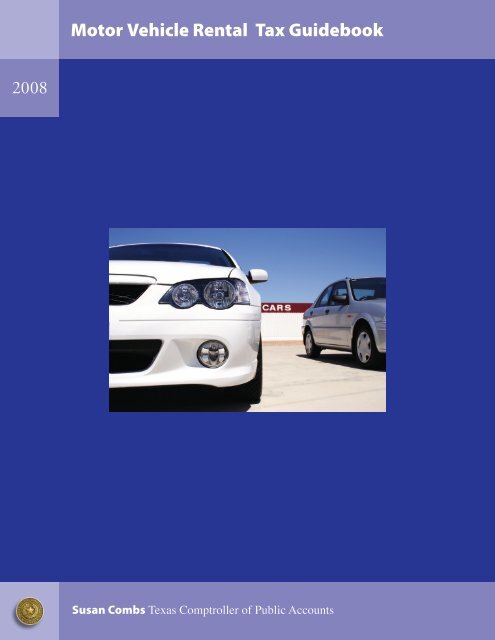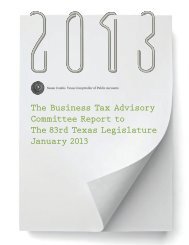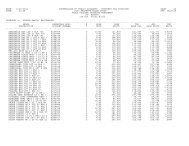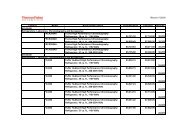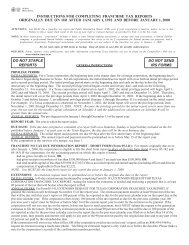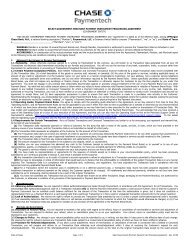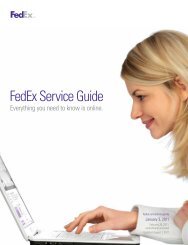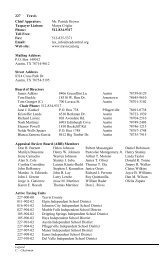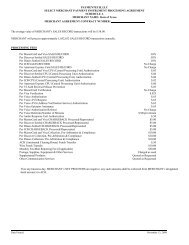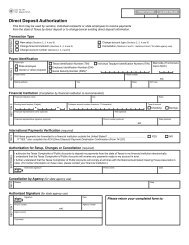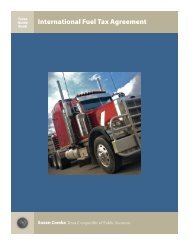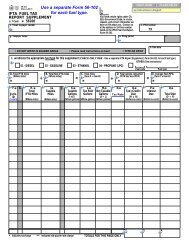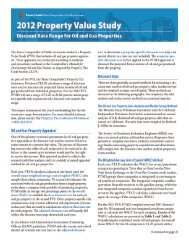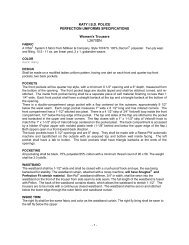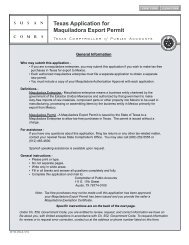96-143 Motor Vehicle Rental Tax Guidebook - Texas Comptroller of ...
96-143 Motor Vehicle Rental Tax Guidebook - Texas Comptroller of ...
96-143 Motor Vehicle Rental Tax Guidebook - Texas Comptroller of ...
Create successful ePaper yourself
Turn your PDF publications into a flip-book with our unique Google optimized e-Paper software.
<strong>Motor</strong> <strong>Vehicle</strong> <strong>Rental</strong> <strong>Tax</strong> <strong>Guidebook</strong><br />
2008<br />
Susan Combs <strong>Texas</strong> <strong>Comptroller</strong> <strong>of</strong> Public Accounts
Table <strong>of</strong> Contents<br />
Introduction........................................................................................................................................ 1<br />
Definitions........................................................................................................................................... 2<br />
Bad debt..................................................................................................................................................................... 2<br />
Fair market value......................................................................................................................................................... 2<br />
Fair market value deduction........................................................................................................................................ 2<br />
Farm machine............................................................................................................................................................. 2<br />
Gross rental receipts.................................................................................................................................................... 2<br />
Gross <strong>Rental</strong> Receipts <strong>Tax</strong> (<strong>Rental</strong> <strong>Tax</strong>)....................................................................................................................... 2<br />
Minimum Gross <strong>Rental</strong> Receipts <strong>Tax</strong> (Minimum <strong>Tax</strong> or Minimum <strong>Rental</strong> <strong>Tax</strong>)......................................................... 2<br />
Mobile Office.............................................................................................................................................................. 2<br />
<strong>Motor</strong> vehicle.............................................................................................................................................................. 2<br />
Out-<strong>of</strong>-state rental...................................................................................................................................................... 2<br />
Person......................................................................................................................................................................... 2<br />
Possession owner......................................................................................................................................................... 2<br />
<strong>Rental</strong>......................................................................................................................................................................... 2<br />
Replaced vehicle.......................................................................................................................................................... 2<br />
<strong>Tax</strong>able value............................................................................................................................................................... 3<br />
<strong>Texas</strong> rental................................................................................................................................................................. 3<br />
Timber machine.......................................................................................................................................................... 3<br />
Title owner................................................................................................................................................................. 3<br />
Registering <strong>Vehicle</strong>s For <strong>Rental</strong>................................................................................................. 4<br />
<strong>Tax</strong> Paid at Registration............................................................................................................................................... 4<br />
<strong>Tax</strong>-Free Registration.................................................................................................................................................. 4<br />
Fair Market Value Deduction...................................................................................................................................... 4<br />
Example <strong>of</strong> Application for <strong>Texas</strong> Certificate <strong>of</strong> Title (Form 130-U)............................................................................ 5<br />
Exemptions, Bad Debts and Reimbursements................................................................... 6<br />
Exemptions................................................................................................................................................................. 6<br />
Exemption Certificate................................................................................................................................................. 6<br />
Bad Debts................................................................................................................................................................... 6<br />
Reimbursement........................................................................................................................................................... 6<br />
Example <strong>of</strong> <strong>Motor</strong> <strong>Vehicle</strong> <strong>Rental</strong> Exemption Certificate (Form 14-305, back)........................................................... 8<br />
Example <strong>of</strong> <strong>Texas</strong> <strong>Motor</strong> <strong>Vehicle</strong> <strong>Rental</strong> <strong>Tax</strong> Return (Form 14-103, front).................................................................. 9<br />
Example <strong>of</strong> <strong>Texas</strong> <strong>Motor</strong> <strong>Vehicle</strong> <strong>Rental</strong> <strong>Tax</strong> Return (Form 14-103, back)................................................................. 10<br />
Minimum <strong>Tax</strong>....................................................................................................................................11<br />
Destroyed or Stolen <strong>Vehicle</strong>s..................................................................................................................................... 11<br />
Credits against Minimum <strong>Tax</strong>................................................................................................................................... 11<br />
Verification Certificate.............................................................................................................................................. 11<br />
Recordkeeping.......................................................................................................................................................... 11<br />
Credits Nontransferable............................................................................................................................................ 11<br />
Example <strong>of</strong> <strong>Texas</strong> <strong>Motor</strong> <strong>Vehicle</strong> <strong>Rental</strong> <strong>Tax</strong> Return – Supplement (Form 14-104, front).......................................... 12<br />
Example <strong>of</strong> <strong>Texas</strong> <strong>Motor</strong> <strong>Vehicle</strong> <strong>Rental</strong> <strong>Tax</strong> Return – Supplement (Form 14-104, back).......................................... 13<br />
Example <strong>of</strong> <strong>Motor</strong> <strong>Vehicle</strong> Verification Certificate for <strong>Rental</strong> <strong>Tax</strong> (Form 14-305, front)............................................ 14<br />
<strong>Motor</strong> <strong>Vehicle</strong> <strong>Rental</strong> <strong>Tax</strong> <strong>Guidebook</strong><br />
i
<strong>Tax</strong> Returns........................................................................................................................................15<br />
Monthly, Quarterly and Annual <strong>Tax</strong> Returns............................................................................................................ 15<br />
Discount for Timely Filing........................................................................................................................................ 15<br />
Prepaying.................................................................................................................................................................. 15<br />
Penalty for Failure to File or Pay................................................................................................................................ 15<br />
Supplement: <strong>Vehicle</strong>s No Longer In <strong>Rental</strong> Service................................................................................................... 15<br />
Going Out <strong>of</strong> Business.............................................................................................................................................. 15<br />
Electronic Funds Transfer.......................................................................................................................................... 16<br />
Example <strong>of</strong> <strong>Texas</strong> <strong>Motor</strong> <strong>Vehicle</strong> <strong>Rental</strong> <strong>Tax</strong> Declared Estimate and Prepayment (Form 14-105).............................. 17<br />
Records................................................................................................................................................18<br />
Seller......................................................................................................................................................................... 18<br />
Owner <strong>of</strong> a <strong>Rental</strong> <strong>Vehicle</strong>......................................................................................................................................... 18<br />
Availability <strong>of</strong> Records............................................................................................................................................... 18<br />
Accounting Methods................................................................................................................................................. 18<br />
Audits...................................................................................................................................................19<br />
Entrance Conference................................................................................................................................................. 19<br />
Records Required...................................................................................................................................................... 19<br />
Audit Procedures....................................................................................................................................................... 19<br />
Post-Audit Conferences............................................................................................................................................. 19<br />
Audit Review............................................................................................................................................................ 19<br />
Redetermination Hearing.......................................................................................................................................... 19<br />
<strong>Motor</strong> <strong>Vehicle</strong> <strong>Rental</strong> <strong>Tax</strong> Forms..............................................................................................20<br />
ii<br />
<strong>Motor</strong> <strong>Vehicle</strong> <strong>Rental</strong> <strong>Tax</strong> <strong>Guidebook</strong>
Introduction<br />
If you rent motor vehicles in <strong>Texas</strong>, you must have a <strong>Texas</strong><br />
<strong>Motor</strong> <strong>Vehicle</strong> <strong>Rental</strong> <strong>Tax</strong> Permit. The permit is available from<br />
the <strong>Texas</strong> <strong>Comptroller</strong> <strong>of</strong> Public Accounts (<strong>Comptroller</strong>).<br />
The law requires you to have a permit if you rent vehicles to<br />
others for consideration and any <strong>of</strong> these conditions apply:<br />
• your rental agreements are for 180 days or fewer;<br />
• the vehicles will be re-rented, regardless <strong>of</strong> the period<br />
covered by the agreements; or<br />
• you are the vehicles’ manufacturer, regardless <strong>of</strong> the<br />
period covered by the agreements.<br />
After the <strong>Comptroller</strong>’s <strong>of</strong>fice issues you a permit, you will<br />
receive periodic preprinted returns to report the tax due on<br />
your rentals.<br />
To get a rental tax permit application or for more information<br />
about the rental tax, you can download the application at<br />
www.window.state.tx.us, visit your local <strong>Comptroller</strong>’s field<br />
<strong>of</strong>fice, e-mail us at tax.help@cpa.state.tx.us, or call us toll-free<br />
at (800) 252-1382.<br />
Cities and counties may also impose tax on short-term rentals.<br />
Any such taxes are administered by the local jurisdictions,<br />
and you should contact them directly for more information.<br />
<strong>Motor</strong> <strong>Vehicle</strong> <strong>Rental</strong> <strong>Tax</strong> <strong>Guidebook</strong> 1
Definitions<br />
Bad debt – any amount due on a rental agreement that is<br />
written <strong>of</strong>f as uncollectable. The amount must be entered on<br />
the rental company’s books as a bad debt and claimed as a<br />
deduction for federal income tax purposes.<br />
Fair market value – a vehicle’s actual selling price when retired<br />
from service or its depreciated book value if it is no longer<br />
used and is <strong>of</strong>fered for sale.<br />
Fair market value deduction – a method by which the taxable<br />
value <strong>of</strong> a rental vehicle purchase may be reduced for tax<br />
purposes.<br />
Farm machine – a self-propelled motor vehicle specially<br />
adapted or modified to apply plant food materials, agricultural<br />
chemicals or feed for livestock. “Farm machine” does<br />
not include a self-propelled motor vehicle specially adapted<br />
for the transportation <strong>of</strong> agricultural products.<br />
Gross rental receipts – the consideration the owner receives<br />
for use <strong>of</strong> the vehicle. Receipts can be the value <strong>of</strong> property or<br />
services as well as money. Gross receipts also include any extra<br />
charges the owner may make on the rental agreement for title<br />
fees, registration fees and property taxes. So that such charges<br />
are not construed to be tax assessments, invoices should show<br />
them as reimbursements.<br />
<strong>Tax</strong>able gross rental receipts do not include discounts; separately<br />
stated charges for insurance; assessments for damages to a<br />
rental vehicle occurring during the agreement period; or separately<br />
stated receipts for motor fuel sold by the vehicle’s owner.<br />
A charge for “collision damage waiver” or “collision protection<br />
charge” does not qualify as a charge for insurance and is therefore<br />
considered part <strong>of</strong> the taxable gross rental receipts.<br />
Gross <strong>Rental</strong> Receipts <strong>Tax</strong> (<strong>Rental</strong> <strong>Tax</strong>) – imposed on the<br />
gross rental receipts derived from the rental <strong>of</strong> a motor vehicle<br />
without a driver. The tax rate is 10 percent on a contract <strong>of</strong> 30<br />
days or fewer and 6.25 percent on a contract for 31-180 days.<br />
Minimum Gross <strong>Rental</strong> Receipts <strong>Tax</strong> (Minimum <strong>Tax</strong> or<br />
Minimum <strong>Rental</strong> <strong>Tax</strong>) – equal to 6.25 percent <strong>of</strong> the vehicle’s<br />
taxable value. If the rental vehicle was registered taxfree,<br />
the minimum tax is the amount <strong>of</strong> tax the rental vehicle<br />
must generate in order to relieve the owner <strong>of</strong> the tax liability<br />
established at registration.<br />
Mobile Office – A trailer designed to be used as an <strong>of</strong>fice,<br />
sales outlet or other workplace.<br />
<strong>Motor</strong> vehicle – a self-propelled vehicle designed to transport<br />
persons or property on a public highway. The term includes<br />
trailers, semi-trailers and “house trailers” as defined by the<br />
Certificate <strong>of</strong> Title Act, Transportation Code.<br />
House trailers could include travel trailers, park models and<br />
bunkhouses. Mobile <strong>of</strong>fices are not taxed as motor vehicles,<br />
but are subject to sales tax. Mobile homes and modular<br />
homes are not motor vehicles, but are subject to the <strong>Texas</strong><br />
Manufactured Housing Sales and Use <strong>Tax</strong>.<br />
“<strong>Motor</strong> vehicle” does not mean:<br />
• a mobile <strong>of</strong>fice;<br />
• a device moved only by human power;<br />
• a device used exclusively upon stationary rails or<br />
tracks;<br />
• road-building machinery; or<br />
• equipment transportable over the highways but designed<br />
to perform a specialized function that does not<br />
include transporting persons or property.<br />
Out-<strong>of</strong>-state rental – when a customer takes delivery <strong>of</strong> a<br />
rental vehicle outside <strong>of</strong> the state. The receipts from an out<strong>of</strong>-state<br />
rental are not subject to tax for the entire period <strong>of</strong><br />
the original agreement even if the customer brings the vehicle<br />
into <strong>Texas</strong>. If the rental agreement is renewed or extended<br />
while the vehicle is in <strong>Texas</strong>, however, it’s considered a <strong>Texas</strong><br />
rental and <strong>Texas</strong> tax is due on these receipts.<br />
Person – an individual, firm, corporation or association.<br />
Possession owner – someone who rents a motor vehicle for<br />
re-rental. The possession owner does not have title to the vehicle<br />
but must collect and remit tax on the re-rentals.<br />
<strong>Rental</strong> – an agreement to give exclusive use <strong>of</strong> a motor vehicle<br />
to someone for a consideration when any <strong>of</strong> the following<br />
conditions apply:<br />
• the agreement is for 180 days or fewer;<br />
• the vehicle will be re-rented, regardless <strong>of</strong> the period<br />
covered by the agreement; or<br />
• you are the manufacturer <strong>of</strong> the vehicle, regardless <strong>of</strong><br />
the period covered by the agreement.<br />
Any agreement that includes a driver or chauffeur is not a<br />
rental but a service, and is not subject to the rental tax.<br />
Replaced vehicle – a vehicle taken out <strong>of</strong> rental service. The<br />
value <strong>of</strong> a replaced vehicle can be used to reduce the taxable<br />
value <strong>of</strong> another vehicle purchased to be rented. Except as<br />
provided below to qualify, a replaced vehicle must have been<br />
titled in <strong>Texas</strong> in the rental company’s name. The replaced<br />
vehicle must no longer be used and either sold or <strong>of</strong>fered<br />
for sale.<br />
2 <strong>Motor</strong> <strong>Vehicle</strong> <strong>Rental</strong> <strong>Tax</strong> <strong>Guidebook</strong>
The vehicle must be used as a fair market value deduction<br />
within 18 months <strong>of</strong> the date it was removed from service.<br />
The term also includes a vehicle titled in <strong>Texas</strong> in the name <strong>of</strong><br />
a related rental permit holder if either party holds a beneficial<br />
ownership interest in the other party <strong>of</strong> at least 80 percent or acquires<br />
all <strong>of</strong> its vehicles exclusively from franchised dealers whose<br />
franchisor shares common ownership with the other party.<br />
<strong>Tax</strong>able value – the total sales price less the value <strong>of</strong> a trade-in<br />
vehicle or the fair market value <strong>of</strong> a replaced vehicle. Total sales<br />
price is the amount paid for a motor vehicle and all accessories<br />
that are attached to it at the time <strong>of</strong> sale.<br />
<strong>Texas</strong> rental – when a customer takes delivery <strong>of</strong> a rental vehicle<br />
in <strong>Texas</strong>. The receipts from the entire rental agreement are<br />
subject to <strong>Texas</strong> gross rental receipts tax even if the customer<br />
takes the vehicle out <strong>of</strong> state. A renewal or extension <strong>of</strong> the<br />
agreement while the vehicle is out <strong>of</strong> state is not a <strong>Texas</strong> rental<br />
and the receipts are not subject to <strong>Texas</strong> tax.<br />
Timber machine – a self-propelled motor vehicle specially<br />
adapted or modified for use primarily in timber operations.<br />
Timber machine does not include any self-propelled motor<br />
vehicle specifically designed or adapted for the primary purpose<br />
<strong>of</strong> transporting timber or timber products.<br />
Title owner – the person named as the owner on the certificate<br />
<strong>of</strong> title. The term also includes a person who is the legal<br />
owner because <strong>of</strong> a lease/purchase or conditional sales contract<br />
where the seller retains title until full payment is made. The<br />
title owner is responsible for satisfying the minimum tax.<br />
<strong>Motor</strong> <strong>Vehicle</strong> <strong>Rental</strong> <strong>Tax</strong> <strong>Guidebook</strong> 3
Registering <strong>Vehicle</strong>s For <strong>Rental</strong><br />
There are two types <strong>of</strong> motor vehicle rental permits. One type<br />
allows tax-free registration when you title a rental vehicle in your<br />
name. The other type <strong>of</strong> permit requires that you pay motor vehicle<br />
sales and use tax at the time <strong>of</strong> registration or titling.<br />
To be able to register rental vehicles tax free, you must be an<br />
authorized <strong>Texas</strong> automobile dealer licensed according to the<br />
Transportation Code, or the title owner <strong>of</strong> at least five different<br />
motor vehicles that will be rented within a 12-month<br />
period. If you do not meet these qualifications, you must pay<br />
tax when you register the rental vehicle.<br />
The purchase or use <strong>of</strong> a diesel-powered motor vehicle with a<br />
gross registered weight <strong>of</strong> more than 14,000 pounds is subject<br />
to the <strong>Texas</strong> Emissions Reduction Plan (TERP) surcharge.<br />
This surcharge is paid at the time <strong>of</strong> registration with your<br />
county tax assessor-collector at a rate <strong>of</strong> 2.5 percent on 19<strong>96</strong><br />
and older vehicles or 1 percent on newer models. The surcharge<br />
is not imposed on rental agreements.<br />
<strong>Tax</strong> Paid at Registration<br />
If you do not qualify to register rental vehicles tax free, you<br />
must pay the 6.25 percent motor vehicle sales and use tax when<br />
you register a vehicle for rental. Complete the Application for<br />
<strong>Texas</strong> Certificate <strong>of</strong> Title/<strong>Motor</strong> <strong>Vehicle</strong> <strong>Tax</strong> Statement (Form<br />
130-U) when you register the rental vehicle. To avoid a penalty,<br />
you must pay the tax within 20 county working days<br />
after you take delivery or bring the vehicle into <strong>Texas</strong>.<br />
If you pay tax at registration, you can keep the rental tax you<br />
collect from your customers until you have reimbursed yourself<br />
for the full amount <strong>of</strong> tax you paid. You may not reimburse<br />
yourself for the TERP surcharge with rental tax collections.<br />
<strong>Tax</strong>-Free Registration<br />
If you are eligible for tax-free registration, you can establish a<br />
minimum tax liability instead <strong>of</strong> paying the 6.25 percent motor<br />
vehicle sales or use tax when registering a motor vehicle<br />
for rental. You can also deduct the value <strong>of</strong> a trade-in or the<br />
fair market value <strong>of</strong> a replaced vehicle from the price <strong>of</strong> a vehicle<br />
purchased for rental. You must pay the TERP surcharge<br />
at the time <strong>of</strong> registration.<br />
The minimum tax liability is equal to 6.25 percent <strong>of</strong> the<br />
taxable value <strong>of</strong> the vehicle. For example, if you buy a vehicle<br />
for $11,000 and your trade-in is worth $4,400, the taxable<br />
value <strong>of</strong> the vehicle is $6,600 ($11,000 minus $4,400). If you<br />
registered the vehicle tax free for rental, then the minimum<br />
tax would be $412.50 ($6,600 multiplied by 6.25 percent).<br />
You can satisfy the minimum tax liability by collecting tax<br />
when you rent the vehicle and reporting and paying the tax<br />
to the <strong>Comptroller</strong>. If you retire the vehicle from rental service<br />
and have not collected enough rental tax to satisfy the<br />
minimum tax liability, you must pay the difference to the<br />
<strong>Comptroller</strong>’s <strong>of</strong>fice.<br />
To register a vehicle tax free, you must complete an application<br />
for <strong>Texas</strong> Certificate <strong>of</strong> Title/<strong>Motor</strong> <strong>Vehicle</strong> <strong>Tax</strong> Statement<br />
(Form 130-U). You can get the application from your county<br />
tax assessor-collector or the <strong>Texas</strong> <strong>Comptroller</strong>’s <strong>of</strong>fice.<br />
When you complete the application, you will also show the<br />
purchase price, the value <strong>of</strong> any vehicle used as a trade-in or<br />
for a fair market value deduction, and the calculated minimum<br />
rental tax. You will also have to provide your rental<br />
permit number. The application must be signed by both the<br />
purchaser and the seller.<br />
Remember, giving false information on title transfer documents<br />
is a third degree felony.<br />
Fair Market Value Deduction<br />
A fair market value deduction can only be claimed by those<br />
rental accounts that qualify to register their rental vehicles tax<br />
free. Other rental accounts must have an actual trade-in to<br />
reduce the taxable value <strong>of</strong> a rental vehicle.<br />
If you are eligible to take a fair market value deduction and<br />
have sold a vehicle before purchasing another one for rental,<br />
you can take a deduction equal to the sales price <strong>of</strong> the replaced<br />
vehicle. For example, if you sold a vehicle for $5,000,<br />
its fair market value is $5,000.<br />
If you buy a replacement vehicle before you sell the old one,<br />
you can claim a fair market value deduction on the old one<br />
only if it is <strong>of</strong>fered for sale and is no longer being used. Since<br />
you do not yet know the price the vehicle will sell for, you can<br />
use the depreciated book value as the fair market value as long<br />
as it is based on generally accepted accounting principles. You<br />
cannot make an adjustment later if the vehicle sells for more<br />
or less than the depreciated book value.<br />
If the <strong>Comptroller</strong>’s <strong>of</strong>fice determines that your book value is<br />
not based on accepted accounting principles, the fair market<br />
value will be the purchase price you paid for the vehicle less<br />
depreciation at the rate <strong>of</strong> 2 percent per month for the first<br />
36 months and 1 percent per month for the remaining depreciable<br />
life.<br />
4 <strong>Motor</strong> <strong>Vehicle</strong> <strong>Rental</strong> <strong>Tax</strong> <strong>Guidebook</strong>
Example <strong>of</strong> Application for <strong>Texas</strong> Certificate <strong>of</strong> Title<br />
(Form 130-U)<br />
APPLICATION FOR TEXAS CERTIFICATE OF TITLE<br />
SHADED AREAS ARE TO BE COMPLETED BY THE SELLER<br />
TYPE OR PRINT NEATLY IN INK<br />
TAX OFFICE USE ONLY<br />
<strong>Tax</strong> Collector<br />
County<br />
Date<br />
Transaction Number<br />
1. <strong>Vehicle</strong> Identification Number 2. Year 3. Make 4. Body Style<br />
SPV $<br />
County Use Only<br />
5. Model 6. Odometer Reading 7. Empty Weight 8. Carrying Capacity (lbs.) 9. Tonnage<br />
10ths<br />
10. Trailer Type<br />
Semi Full<br />
14. Applicant's/Owner's Name(s)<br />
11. Plate No. 12. <strong>Vehicle</strong> Unit No.<br />
Appraisal Value $<br />
13. Applicant's/Additional Applicant's<br />
Social Security Numbers<br />
(See * below) or Federal <strong>Tax</strong> ID Number<br />
Address<br />
City, State, Zip Code<br />
County Name<br />
14a. Registrant's Name<br />
(Renewal Notice Recipient)<br />
Address<br />
Statement <strong>of</strong> Fact for Non-Disclosure,<br />
City, State, Zip Code<br />
County Name<br />
VTR-171, Attached.<br />
14b. <strong>Vehicle</strong> Physical Location<br />
City, State, Zip Code<br />
15. Previous Owner's Name<br />
15a. GDN - Dealer Use Only<br />
Address<br />
City, State, Zip Code<br />
THIS MOTOR VEHICLE IS SUBJECT TO THE FOLLOWING FIRST LIEN<br />
16. 1st Lien Date 1st Lienholder Name<br />
16a. Additional Lien(s)<br />
Address<br />
YES (If additional liens are to be<br />
recorded, attach Form VTR-267.)<br />
City, State, Zip Code<br />
17. FOR CORRECTED TITLE, Change in <strong>Vehicle</strong> Description VIN No Change in Add Remove Odometer Odometer<br />
CHECK REASON(S) Year Make Body Style Other Ownership Lien Lien Lien<br />
Brand Reading<br />
18. ODOMETER DISCLOSURE - FEDERAL AND STATE LAW REQUIRES THAT YOU STATE THE MILEAGE UPON TRANSFER OF OWNERSHIP. FAILURE TO COMPLETE OR<br />
PROVIDING A FALSE STATEMENT MAY RESULT IN FINES AND/OR IMPRISONMENT.<br />
I, , state that the odometer now reads (no tenths).<br />
** (Name <strong>of</strong> Seller/Agent)<br />
THE MILEAGE SHOWN IS A - Actual Mileage N - Not Actual Mileage WARNING - ODOMETER DISCREPANCY X - Mileage Exceeds Mechanical Limits<br />
** IF NO SELLER/AGENT, TITLE APPLICANT SHOULD CHECK ONE OF THE 3 BOXES ABOVE UNLESS NUMBER 6 INDICATES "EXEMPT."<br />
MOTOR VEHICLE TAX STATEMENT<br />
19. CHECK ONLY IF APPLICABLE<br />
I hold <strong>Motor</strong> <strong>Vehicle</strong> Retailer's (<strong>Rental</strong>) Permit No.<br />
and will satisfy the minimum tax liability (V.A.T.S., <strong>Tax</strong> Code, §152.046 [c]).<br />
I am a Dealer or Lessor and qualify to take the Fair Market Value Deduction (V.A.T.S., <strong>Tax</strong> Code, §152.002 [c]).<br />
20. DESCRIPTION OF VEHICLE Year Make <strong>Vehicle</strong> Identification Number 20a. ADDITIONAL TRADE - INS (Y/N)<br />
TRADED IN (if any)<br />
21. SALES AND USE TAX COMPUTATION<br />
(a) Sales Price ($ rebate has been deducted) $<br />
(b) Less Trade - In Amount, Describe in Item 20 Above $ ( )<br />
(c) For Dealers/Lessors/<strong>Rental</strong> ONLY - Fair Market Value<br />
Deduction, Describe in Item 20 Above $ ( )<br />
(d) <strong>Tax</strong>able Amount (Item a. minus Item b./Item c.) $<br />
(e) 6.25% <strong>Tax</strong> on <strong>Tax</strong>able Amount (Multiply Item d. by .0625) $<br />
(f) Late <strong>Tax</strong> Payment Penalty 5% or 10% $<br />
(g) <strong>Tax</strong> Paid to (STATE) $<br />
(h) AMOUNT OF TAX AND PENALTY DUE<br />
$<br />
(Item e. plus Item f. minus Item g.)<br />
$90 New Resident <strong>Tax</strong> - (Previous State)<br />
$5 Even Trade <strong>Tax</strong><br />
$10 Gift <strong>Tax</strong><br />
$65 Rebuilt Salvage Fee<br />
2.5% Emissions Fee (Diesel <strong>Vehicle</strong>s 19<strong>96</strong> and Older > 14,000 lbs)<br />
1% Emissions Fee (Diesel <strong>Vehicle</strong>s 1997 and Newer > 14,000 lbs)<br />
Exemption claimed under the <strong>Motor</strong> <strong>Vehicle</strong> Sales and Use <strong>Tax</strong> Law because<br />
$28 or $33 APPLICATION FEE FOR CERTIFICATE OF TITLE<br />
(Contact your County <strong>Tax</strong> Assessor-Collector for the correct fee.)<br />
I HEREBY CERTIFY THAT ALL STATEMENTS IN THIS DOCUMENT ARE TRUE AND<br />
CORRECT TO THE BEST OF MY KNOWLEDGE AND BELIEF.<br />
22.<br />
Signature <strong>of</strong> SELLER, DONOR, OR TRADER<br />
PRINTED NAME (Same as signature)<br />
Date<br />
23.<br />
Signature <strong>of</strong> PURCHASER, DONEE, OR TRADER PRINTED NAME (Same as signature) Date<br />
RIGHTS OF SURVIVORSHIP OWNERSHIP AGREEMENT (MARRIED PERSONS)<br />
WE, THE PERSONS WHOSE SIGNATURES APPEAR HEREIN, HEREBY AGREE THAT THE<br />
OWNERSHIP OF THE VEHICLE DESCRIBED ON THIS APPLICATION FOR TITLE, SHALL FROM THIS<br />
DAY FORWARD BE HELD JOINTLY, AND IN THE EVENT OF DEATH OF EITHER OF THE PERSONS<br />
NAMED IN THE AGREEMENT, THE OWNERSHIP OF THE VEHICLE SHALL VEST IN THE SURVIVOR.<br />
NON-MARRIED PERSONS ARE REQUIRED TO EXECUTE A RIGHTS OF SURVIVORSHIP<br />
OWNERSHIP AGREEMENT FOR A MOTOR VEHICLE, FORM VTR-122.<br />
SIGNATURE<br />
SIGNATURE<br />
Date<br />
Date<br />
WARNING: Transportation Code, §501.155, provides that falsifying information on title transfer documents is a third-degree felony <strong>of</strong>fense punishable by not more than ten (10) years in prison or not more than one (1) year in a<br />
community correctional facility. In addition to imprisonment, a fine <strong>of</strong> up to $10,000 may also be imposed.<br />
* NOTE: Transportation Code, §501.0235, REQUIRES that the applicant's social security number be provided when applying for a certificate <strong>of</strong> title. If the applicant does not have a social security Number, Form VTR-171,<br />
Statement <strong>of</strong> Fact for Non-disclosure <strong>of</strong> a Social Security Number, must accompany this application. This information is requested for owner identification purposes.<br />
Form-130-U (Rev. 8/2006)<br />
Contact/Help<br />
Print Form<br />
<strong>Motor</strong> <strong>Vehicle</strong> <strong>Rental</strong> <strong>Tax</strong> <strong>Guidebook</strong> 5
Exemptions, Bad Debts and Reimbursements<br />
Exemptions<br />
There is no tax on the rentals listed below. The receipts from<br />
such rentals must be included as total contract receipts on<br />
the rental return, but are not counted as part <strong>of</strong> your taxable<br />
contract receipts.<br />
The following types <strong>of</strong> rentals are exempt from tax.<br />
• <strong>Rental</strong>s to a public agency – a public agency is an<br />
instrumentality <strong>of</strong> the U.S. government or a department,<br />
commission, board, <strong>of</strong>fice, institution or other<br />
agency <strong>of</strong> this state or <strong>of</strong> a county, city, town, school<br />
district, hospital district, water district or other special<br />
district or authority or political subdivision created by<br />
or under the <strong>Texas</strong> constitution or statutes.<br />
• <strong>Rental</strong>s to a church or religious society – no tax is due<br />
if the vehicle is designed to carry more than six passengers<br />
and at least 80 percent <strong>of</strong> the vehicle’s operating<br />
time is used to provide transportation to and from<br />
church or religious services or meetings. A vehicle<br />
rented for the <strong>of</strong>ficial or personal use <strong>of</strong> a minister is<br />
not exempt.<br />
• <strong>Rental</strong>s for re-rental – if you rent a vehicle to someone<br />
who will then re-rent it to others, do not collect rental<br />
tax.<br />
• <strong>Rental</strong>s to farmers and ranchers – there’s no tax on<br />
rentals <strong>of</strong> a trailer, semi-trailer or a farm machine.<br />
• <strong>Rental</strong>s to timber operators – there’s no tax on rentals<br />
<strong>of</strong> a trailer, semi-trailer or timber machine.<br />
• <strong>Rental</strong>s to a child-care facility – no tax is due when<br />
renting a vehicle to a qualified residential child-care<br />
facility to be used primarily to transport children residing<br />
in the facility. A qualified residential child-care<br />
facility means one licensed under Chapter 42 Human<br />
Resources Code to provide residential care 24 hours<br />
a day in a single residential group to children who<br />
do not require specialized services or treatment and<br />
children who are emotionally disturbed.<br />
There is no exemption for vehicle rentals to a non-pr<strong>of</strong>it or<br />
public service organization, even if the organization is funded<br />
by a public agency.<br />
Exemption Certificate<br />
When making an exempt rental, you must attach an exemption<br />
certificate (Form 14-305, back) to the rental contract.<br />
The certificate must be signed by an authorized representative<br />
<strong>of</strong> the group or organization renting the vehicle. (See page 8<br />
for an acceptable form <strong>of</strong> an exemption certificate. You can<br />
reproduce this form in any size compatible with your recordkeeping<br />
requirements.)<br />
If you frequently make exempt rentals to a single person or<br />
organization, you do not have to get an exemption certificate<br />
for each rental. However, you must have a method <strong>of</strong> correlating<br />
specific invoices or rental contracts to that organization’s<br />
signed exemption certificate in your files.<br />
If you do not get an exemption certificate when you rent a<br />
vehicle tax free, you are responsible for proving the rental was<br />
exempt.<br />
Bad Debts<br />
You can use bad debts to reduce the amount <strong>of</strong> your rental tax<br />
liability. Bad debts are those that are determined uncollectable,<br />
written <strong>of</strong>f as uncollectable in your books, and claimed as a bad<br />
debt deduction for federal income tax purposes.<br />
To reduce your tax liability, you can deduct a bad debt from<br />
your gross rental receipts. If the bad debt includes taxable<br />
and non-taxable receipts, you can deduct only the taxable<br />
amount from gross rental receipts. If you’ve already remitted<br />
the tax to the <strong>Comptroller</strong>’s <strong>of</strong>fice, you can claim credit<br />
for the tax paid on the uncollectible charge on a current tax<br />
return or file an amended return for the period the bad debts<br />
were written <strong>of</strong>f.<br />
To support a claim for a bad debt deduction or credit, you<br />
must keep records <strong>of</strong> the date <strong>of</strong> the rental, the name and address<br />
<strong>of</strong> the customer, the amount the customer agreed to pay,<br />
any amount on which you have already paid tax, payment<br />
or other credit applied to the account, and evidence that the<br />
amount has been legally charged <strong>of</strong>f as a bad debt for federal<br />
income tax purposes.<br />
Any amount claimed as a bad debt cannot be used as a credit<br />
against the minimum gross rental receipts tax owed on a<br />
vehicle.<br />
Reimbursement<br />
If you pay motor vehicle sales or use tax on a rental vehicle,<br />
you can retain the rental tax you collect to recover the tax<br />
you’ve paid.<br />
You cannot recover more tax than you paid when you registered<br />
the vehicle. For example, if you paid $1,000 in motor<br />
vehicle sales or use tax at registration, you can retain no more<br />
than $1,000 in rental tax.<br />
To recover the tax you’ve paid, deduct the gross receipts derived<br />
from the rental <strong>of</strong> the vehicle from either line 2 (receipts<br />
from short term contracts) or line 6 (receipts from long term<br />
contracts) on your <strong>Texas</strong> <strong>Motor</strong> <strong>Vehicle</strong> <strong>Rental</strong> <strong>Tax</strong> Return<br />
6 <strong>Motor</strong> <strong>Vehicle</strong> <strong>Rental</strong> <strong>Tax</strong> <strong>Guidebook</strong>
(Form 14-103, front). This deduction reduces the amount<br />
subject to tax (line 3 for short-term contracts or line 7 for<br />
long-term contracts).<br />
For example, you collect $400 in rental receipts on a vehicle<br />
on which you paid tax. If these receipts were from a shortterm<br />
rental, include the $400 in the short-term contract receipts<br />
(line 2) but reduce the taxable short-term contracts receipts<br />
figure (line 3) by $400, thus reimbursing yourself $40<br />
($400 multiplied by 10 percent). If these receipts were from a<br />
long-term rental, include the $400 in the long-term contract<br />
receipts (line 6) but reduce the taxable long-term contract<br />
receipts figure (line 7) by $400, thus reimbursing yourself<br />
$25 ($400 multiplied by 6.25 percent).<br />
If you pay motor vehicle sales tax on a rental vehicle, you can<br />
only use receipts from rentals <strong>of</strong> that specific vehicle to recover<br />
the tax you’ve paid. You cannot recover tax from rental<br />
receipts for a different vehicle.<br />
If you reimburse the title owner for tax paid on a vehicle rented<br />
to you for re-rental, you can recover the tax from the rental tax<br />
you collect. You must keep a verification certificate in your records<br />
as pro<strong>of</strong> <strong>of</strong> tax you’ve paid to the title owner.<br />
<strong>Motor</strong> <strong>Vehicle</strong> <strong>Rental</strong> <strong>Tax</strong> <strong>Guidebook</strong> 7
Example <strong>of</strong> <strong>Motor</strong> <strong>Vehicle</strong> <strong>Rental</strong> Exemption Certificate<br />
(Form 14-305, back)<br />
Form 14-305 (Back)<br />
(Rev. 8-89/5)<br />
MOTOR VEHICLE RENTAL EXEMPTION CERTIFICATE<br />
THIS EXEMPTION CERTIFICATE IS NOT VALID FOR TAX-FREE REGISTRATION.<br />
THIS EXEMPTION CERTIFICATE M UST BE ATTACHED TO THE RENTAL CONTRACT.<br />
Make <strong>of</strong> vehicle<br />
<strong>Motor</strong> or vehicle<br />
identification number<br />
Year model Body style License number<br />
The undersigned claims exemption from payment <strong>of</strong> motor vehicle gross rental receipts tax under the <strong>Tax</strong>es on Sale, <strong>Rental</strong> and Use<br />
<strong>of</strong> <strong>Motor</strong> <strong>Vehicle</strong> Law (TEX.TAX CODE ANN. ch. 152), on the rental <strong>of</strong> the above described motor vehicle from:<br />
<strong>Vehicle</strong> owner<br />
Address (Street & number)<br />
City, state, ZIP code<br />
Renter claims this exemption for the following reason:<br />
A public agency<br />
Rent for Re-rental<br />
A church or religious society<br />
<strong>Vehicle</strong> rented meets the following requirements:<br />
• designed to carry more than six (6) passengers<br />
• primary use must be for providing transportation<br />
to and from church or religious services or<br />
meetings<br />
A residential child-care facility licensed under Chapter<br />
42 <strong>of</strong> the Human Resources Code to care for both<br />
children who do not require specialized care and<br />
children who are emotionally disturbed.<br />
Farm or ranch use (farm trailer, semi-trailer, farm<br />
machinery)<br />
<strong>Vehicle</strong> rented meets the following requirements:<br />
• a trailer used primarily for farming and ranching<br />
• a self-propelled motor vehicle must have been<br />
modified to perform some specialized<br />
farm/ranch related function other than<br />
transportation; such as applying or dispensing<br />
agricultural products, plant food materials or<br />
feed for livestock<br />
I declare that the information contained in this document and any attachments is true and correct to the best <strong>of</strong> my knowledge and<br />
belief.<br />
Exempt person or organization<br />
sign<br />
here<br />
Authorized person<br />
Address (Street & number)<br />
City, state, ZIP code<br />
NOTE: THIS FORM MAY BE REPRODUCED, BUT MUST BE SUBSTANTIALLY IN THE FORM SET OUT ABOVE. DO NOT SEND<br />
THE COMPLETED EXEMPTION CERTIFICATE TO THE COMPTROLLER OF PUBLIC ACCOUNTS.<br />
8 <strong>Motor</strong> <strong>Vehicle</strong> <strong>Rental</strong> <strong>Tax</strong> <strong>Guidebook</strong>
Example <strong>of</strong> <strong>Texas</strong> <strong>Motor</strong> <strong>Vehicle</strong> <strong>Rental</strong> <strong>Tax</strong> Return<br />
(Form 14-103, front)<br />
14-103<br />
(Rev.4-08/18)<br />
a. T Code 15100<br />
b.<br />
TEXAS MOTOR VEHICLE RENTAL TAX RETURN<br />
e.<br />
c. <strong>Tax</strong>payer number d. Filing period f. Due date<br />
g. Name and mailing address (Make any necessary name or address changes below.)<br />
h. IMPORTANT<br />
Black in this box if your mailing<br />
address has changed. Show changes<br />
by the preprinted information.<br />
1.<br />
Black in this box if you are no<br />
longer in business and write in the 2.<br />
date you went out <strong>of</strong> business.<br />
Month Day Year<br />
i. j.<br />
Please read instructions TYPE OR PRINT Do not write in shaded areas Report dollars and cents<br />
1.<br />
2.<br />
3.<br />
4.<br />
5.<br />
6.<br />
7.<br />
8.<br />
9.<br />
10.<br />
11.<br />
12.<br />
13.<br />
14.<br />
15.<br />
Enter the number <strong>of</strong> vehicles you own that were retired from rental service<br />
during this reporting period (See instructions)<br />
1.<br />
Total short term contract receipts (1-30 days) (See instructions)<br />
<strong>Tax</strong>able short term contract receipts (See instructions)<br />
2.<br />
3.<br />
.<br />
.<br />
<strong>Tax</strong> rate<br />
<strong>Tax</strong> due on short term contract receipts (Multiply Item 3 by Item 4)<br />
4.<br />
5.<br />
.<br />
Total long term contract receipts (31-180 days) (See instructions) 6.<br />
.<br />
<strong>Tax</strong>able long term contract receipts (See instructions) 7.<br />
.<br />
<strong>Tax</strong> rate<br />
<strong>Tax</strong> due on long term contract receipts (Multiply Item 7 by Item 8)<br />
8.<br />
9.<br />
.<br />
Unremitted portion <strong>of</strong> minimum gross rental receipts tax<br />
Total tax due (Item 5 plus Items 9 and 10)<br />
Prepayment credits<br />
<strong>Tax</strong> due after prepayments (Item 11 minus Item 12)<br />
DISCOUNT: (See instructions)<br />
(See instructions) 10.<br />
11.<br />
12.<br />
13.<br />
14.<br />
.<br />
.<br />
.<br />
.<br />
.<br />
Net tax due after discount (Item 13 minus Item 14) 15.<br />
.<br />
.1000<br />
.0625<br />
14-103 (Rev.4-08/18)<br />
TEXAS MOTOR VEHICLE RENTAL TAX RETURN<br />
16.<br />
Penalty (see instructions)<br />
16.<br />
.<br />
17.<br />
Interest (see instructions)<br />
17.<br />
.<br />
18.<br />
TOTAL AMOUNT DUE AND PAYABLE<br />
(Item 15 plus Items 16 and 17) 18.<br />
.<br />
<strong>Tax</strong>payer name<br />
k. l.<br />
T Code <strong>Tax</strong>payer number Period<br />
I declare that the information in this document and any attachments<br />
is true and correct to the best <strong>of</strong> my knowledge and belief.<br />
<strong>Tax</strong>payer or duly authorized agent<br />
Make the amount in Item 18 payable to: STATE COMPTROLLER<br />
Mail to: COMPTROLLER OF PUBLIC ACCOUNTS<br />
P.O. Box 149360<br />
Austin, <strong>Texas</strong> 78714-9360<br />
For assistance call (800) 252-1382 toll free nationwide,<br />
or call (512) 463-4600.<br />
Business phone<br />
Date<br />
<strong>Motor</strong> <strong>Vehicle</strong> <strong>Rental</strong> <strong>Tax</strong> <strong>Guidebook</strong> 9
Example <strong>of</strong> <strong>Texas</strong> <strong>Motor</strong> <strong>Vehicle</strong> <strong>Rental</strong> <strong>Tax</strong> Return<br />
(Form 14-103, back)<br />
Form 14-103 (Back)(Rev.4-08/18)<br />
INSTRUCTIONS FOR COMPLETING<br />
THE TEXAS MOTOR VEHICLE<br />
RENTAL TAX RETURN<br />
(TEX. TAX CODE ANN. secs. 152.026 and 152.045)<br />
GENERAL INFORMATION<br />
WHO MUST FILE:<br />
You must file this return if you are a sole owner, partnership, corporation or other organization<br />
who is responsible for collection and/or payment <strong>of</strong> <strong>Texas</strong> <strong>Motor</strong> <strong>Vehicle</strong> <strong>Rental</strong> <strong>Tax</strong>. Failure to<br />
file this report and pay applicable tax may result in collection action as prescribed by Title 2 <strong>of</strong><br />
the <strong>Tax</strong> Code.<br />
Complete and detailed records must be kept <strong>of</strong> all receipts reported and exemptions or reimbursements<br />
claimed so that returns can be verified by a state auditor.<br />
WHEN TO FILE:<br />
Returns must be filed on or before the 20th day <strong>of</strong> the month following the reporting period.<br />
RETURNS MUST BE FILED FOR EVERY PERIOD EVEN IF YOU HAVE NO AMOUNT SUBJECT TO<br />
TAX OR NO TAX DUE.<br />
If the due date falls on a Saturday, Sunday or legal state holiday, the next business day will be<br />
the due date.<br />
FOR ASSISTANCE: Call (800) 252-1382 toll free nationwide, or call (512) 463-4600.<br />
GENERAL INSTRUCTIONS: Please write only in white areas. TYPE OR PRINT<br />
Complete all applicable items that are not preprinted.<br />
If any preprinted information is not correct, mark it out and write in the correct information.<br />
SPECIFIC INSTRUCTIONS<br />
Item c-<br />
Enter the <strong>Tax</strong>payer Number shown on your <strong>Motor</strong> <strong>Vehicle</strong><br />
<strong>Rental</strong> Permit. If you have not received your <strong>Motor</strong> <strong>Vehicle</strong><br />
<strong>Rental</strong> Permit, enter your Social Security Number if sole<br />
ownership or Federal Employer's Identification (FEI)<br />
Number.<br />
Item 11- Enter the total amount due on both short-term and<br />
long-term rental contracts and the unremitted portion <strong>of</strong><br />
the minimum gross rental receipts.<br />
Item d- Enter filing period <strong>of</strong> this return, monthly or quarterly, and Item 12- FOR PREPAYERS ONLY - The amount preprinted in item 12<br />
the last day <strong>of</strong> the period.<br />
includes the allowable prepayment discount for filing your<br />
Item 1- Enter the number <strong>of</strong> vehicles you own that were retired<br />
return and paying the tax due on or before the due date. (If<br />
you prepaid timely and the amount is not preprinted here,<br />
from service during this reporting period. Use the<br />
calculate the credit by dividing the amount you paid by .9825<br />
Supplement to <strong>Motor</strong> <strong>Vehicle</strong> <strong>Rental</strong> <strong>Tax</strong> Return (Form<br />
14-104) to calculate the total amount <strong>of</strong> minimum tax due.<br />
You must file a supplement only when you retire vehicles<br />
and enter the result in item 12). If you are filing your return<br />
and paying the tax late, mark out the preprinted amount and<br />
enter the actual amount you prepaid.<br />
whether or not any additional minimum tax is due.<br />
Item 2- Enter the total amount <strong>of</strong> ALL short-term rental contract<br />
receipts (Short-term contracts 1-30 days)<br />
Item 3- Enter the total amount <strong>of</strong> taxable short-term rental<br />
contract receipts after exemptions and reimbursements.<br />
Item 6- Enter the total amount <strong>of</strong> ALL long-term rental contract<br />
receipts. (Long term contracts 31-180 days)<br />
Item 7- Enter the total amount <strong>of</strong> taxable long-term rental contract<br />
receipts after exemptions and reimbursements.<br />
Reimburse yourself only for motor vehicle sales or use tax<br />
you have previously paid to <strong>Texas</strong> on a rental vehicle.<br />
The total reimbursement may not exceed the amount <strong>of</strong><br />
tax you paid on the vehicle at registration.<br />
Do not use gross rental receipts received from the rental<br />
<strong>of</strong> one vehicle to claim reimbursement for tax paid on a<br />
different vehicle.<br />
Item 10- Unremitted portion <strong>of</strong> minimum gross rental receipts<br />
tax--when a vehicle is no longer used for rental, the<br />
unremitted portion <strong>of</strong> minimum tax must be reported and<br />
paid on the first rental report following retirement <strong>of</strong> the<br />
vehicle.<br />
NOTE: If item 11 is GREATER than item 12, multiply the difference<br />
by 1/2 <strong>of</strong> 1% (.005) and enter the result in item 15.<br />
If item 11 is LESS than item 12 and the credit is to be<br />
refunded, multiply the negative difference by .9825 and enter<br />
the result in item 15. Skip item 14.<br />
DO NOT TAKE THE 1/2 OF 1% DISCOUNT ON CREDIT<br />
BALANCES.<br />
Item 14- Discount - If the return is filed and the tax paid on or before<br />
the due date, enter a discount <strong>of</strong> one-half <strong>of</strong> one percent<br />
(0.005) <strong>of</strong> item 13. (Prepayers see item 12.)<br />
Item 16- PENALTY - IF RETURN IS FILED OR TAX PAID AFTER DUE<br />
DATE, enter penalty. 1 - 30 days late - 5% <strong>of</strong> Item 15. More<br />
than 30 days late - 10% <strong>of</strong> Item 15. (Minimum penalty $1)<br />
Item 17- INTEREST - IF ANY TAX IS UNPAID 61 DAYS AFTER THE DUE<br />
DATE, enter interest on the amount <strong>of</strong> Item 15 calculated at<br />
the rate on Pub. 98-304, online at www.window.state.tx.us, or toll<br />
free at (877) 447-2834.<br />
10 <strong>Motor</strong> <strong>Vehicle</strong> <strong>Rental</strong> <strong>Tax</strong> <strong>Guidebook</strong>
Minimum <strong>Tax</strong><br />
When you take a rental vehicle out <strong>of</strong> service, you must make<br />
sure that you have paid that vehicle’s minimum tax liability.<br />
If you registered the vehicle tax-free and have collected rental<br />
tax equal to or greater than the sales tax that would have been<br />
due when you bought it, you do not owe any additional tax.<br />
If you have not satisfied the minimum tax liability, however,<br />
you must pay any tax still due on your next rental tax return.<br />
You can report the retired vehicle and calculate any tax liability<br />
still due on the <strong>Texas</strong> <strong>Motor</strong> <strong>Vehicle</strong> <strong>Rental</strong> <strong>Tax</strong> Return –<br />
Supplement (Form 14-104, pages 12 and 13). Any unremitted<br />
portion <strong>of</strong> minimum tax is added to your total rental tax<br />
due for the reporting period.<br />
If you paid motor vehicle sales or use tax when you registered<br />
the vehicle, you do not owe any additional tax when you retire<br />
the vehicle from rental service.<br />
If no sales or use tax is due on the original purchase price <strong>of</strong><br />
a vehicle used for rental, there is no minimum rental tax liability.<br />
Destroyed or Stolen <strong>Vehicle</strong>s<br />
If a vehicle is registered tax free for rental and is later destroyed<br />
or stolen and its value not recovered, any remaining<br />
minimum rental tax liability is dismissed and no additional<br />
tax is due. <strong>Vehicle</strong>s whose minimum tax liabilities have been<br />
dismissed cannot be used as fair market value deductions<br />
and must be reported on the <strong>Texas</strong> <strong>Motor</strong> <strong>Vehicle</strong> <strong>Rental</strong> <strong>Tax</strong><br />
Return – Supplement (Form 14-104).<br />
Credits against Minimum <strong>Tax</strong><br />
The minimum tax liability is reduced by the amount <strong>of</strong> rental<br />
tax the title owner collects and remits to the <strong>Comptroller</strong>’s<br />
<strong>of</strong>fice.<br />
Other credits can be applied towards the minimum tax liability.<br />
• The amount <strong>of</strong> tax exempted on the rental <strong>of</strong> a motor<br />
vehicle to a public agency, a church, a qualified childcare<br />
facility, a farm trailer, farm machine, a trailer used<br />
in timber operations or a timber machine can be used<br />
to <strong>of</strong>fset the minimum tax liability.<br />
• If the title owner rents a vehicle to a possession owner<br />
for re-rental, the amount <strong>of</strong> tax the possession owner<br />
collects and remits is used as a credit to <strong>of</strong>fset the minimum<br />
tax liability. A verification certificate is used to<br />
document the credit.<br />
• The amount <strong>of</strong> rental tax collected and remitted to another<br />
state can be used to satisfy the minimum rental<br />
tax liability.<br />
Verification Certificate<br />
The possession owner completes Section I (Rent for Re-<br />
<strong>Rental</strong>) <strong>of</strong> Form 14-305 (front) and gives it to the title owner<br />
to show how much rental tax has been collected. A title owner<br />
whose records include a valid Section I can credit the amount<br />
<strong>of</strong> tax collected and remitted by the possession owner against<br />
the vehicle’s minimum tax liability.<br />
The title owner completes Section II (Reimbursement <strong>of</strong> Sales<br />
or Use <strong>Tax</strong> Verification) <strong>of</strong> Form 14-305 (front) and gives it to<br />
the possession owner to show how much tax was paid when<br />
the vehicle was registered. The title owner can then contract<br />
with the possession owner for reimbursement from rental tax<br />
collected. The verification certificate must show the amount<br />
<strong>of</strong> sales or use tax paid when the vehicle was registered, the<br />
rental tax collected on rental <strong>of</strong> the vehicle, and the amount<br />
<strong>of</strong> reimbursement received from the possession owner.<br />
A possession owner whose records include a valid Section II<br />
can recover up to the amount <strong>of</strong> sales or use tax paid to the<br />
title owner. The total amount <strong>of</strong> reimbursement cannot exceed<br />
the amount <strong>of</strong> sales or use tax paid.<br />
Recordkeeping<br />
You must keep a copy <strong>of</strong> either a <strong>Motor</strong> <strong>Vehicle</strong> Verification<br />
Certificate For <strong>Rental</strong> <strong>Tax</strong> (Form 14-305, front) or a <strong>Motor</strong><br />
<strong>Vehicle</strong> <strong>Rental</strong> Exemption Certificate (Form 14-305, back) in<br />
your records to document each claim for credit.<br />
Credits Nontransferable<br />
Each vehicle registered tax free must generate enough rental<br />
tax to satisfy its own minimum tax liability. <strong>Tax</strong> collected and<br />
remitted from one vehicle’s rental cannot be used to pay a<br />
different vehicle’s liability.<br />
<strong>Motor</strong> <strong>Vehicle</strong> <strong>Rental</strong> <strong>Tax</strong> <strong>Guidebook</strong> 11
Example <strong>of</strong> <strong>Texas</strong> <strong>Motor</strong> <strong>Vehicle</strong> <strong>Rental</strong> <strong>Tax</strong> Return – Supplement<br />
(Form 14-104, front)<br />
14-104<br />
(Rev.7-02/11)<br />
TEXAS MOTOR VEHICLE RENTAL TAX RETURN - SUPPLEMENT<br />
•This supplement must be submitted with the rental tax return when vehicles are removed from rental service.<br />
•Please read instructions •TYPE OR PRINT •Write only in white areas<br />
a. <strong>Tax</strong>payer number b. Period ending<br />
c.<br />
<strong>Tax</strong>payer name and mailing address<br />
• Complete this supplement to<br />
determine the amount <strong>of</strong> Minimum<br />
<strong>Rental</strong> <strong>Tax</strong> due when a motor<br />
vehicle ceases to be used for rental<br />
by the purchaser.<br />
• The total tax due shown on this<br />
supplement MUST be the same as<br />
the amount reported in item 10 on<br />
the return.<br />
1.<br />
YEAR<br />
2.<br />
MAKE<br />
3.<br />
VEHICLE IDENTIFICATION NUMBER<br />
4.<br />
UNIT<br />
NUMBER<br />
5. CHECK IF<br />
STOLEN,<br />
DESTROYED<br />
OR SALES TAX<br />
WAS PAID<br />
6. MINIMUM<br />
RENTAL TAX<br />
DETERMINED AT<br />
REGISTRATION<br />
7.<br />
GROSS RENTAL<br />
TAX COLLECTED<br />
8. TAX DUE<br />
(Item 6 minus 7)<br />
Must be zero or<br />
greater.<br />
9. TOTAL UNREMITTED PORTION OF THE MINIMUM RENTAL TAX<br />
(Enter the combined total from all supplement pages in Item 10 <strong>of</strong> the <strong>Texas</strong> <strong>Motor</strong> <strong>Vehicle</strong> <strong>Rental</strong> <strong>Tax</strong> Return.)<br />
If additional space is needed, copy this form or request addition copies.<br />
12 <strong>Motor</strong> <strong>Vehicle</strong> <strong>Rental</strong> <strong>Tax</strong> <strong>Guidebook</strong>
Example <strong>of</strong> <strong>Texas</strong> <strong>Motor</strong> <strong>Vehicle</strong> <strong>Rental</strong> <strong>Tax</strong> Return – Supplement<br />
(Form 14-104, back)<br />
Form 14-104 (Back) (Rev. 7-02/11)<br />
INSTRUCTIONS FOR COMPLETING THE TEXAS MOTOR VEHICLE RENTAL TAX RETURN SUPPLEMENT<br />
(TEX. TAX CODE ANN. secs. 152.026, 152.045 and 152.046)<br />
Under Ch. 559, Government Code, you are entitled to review, request, and correct information we have on file about you, with limited exceptions<br />
in accordance with Ch. 552, Government Code. To request information for review or to request error correction, contact us at the address or tollfree<br />
number listed on this form.<br />
GENERAL INFORMATION<br />
WHO MUST FILE:<br />
• You must file this supplement if you are required to file a <strong>Texas</strong> <strong>Motor</strong> <strong>Vehicle</strong> <strong>Rental</strong> <strong>Tax</strong> Return<br />
and you remove vehicles from rental use which you purchased for rental service. These include<br />
every rental vehicle titled in your name and every vehicle purchased under conditional sales<br />
contracts or lease-purchase agreements under which you were obligated to buy the vehicle, even<br />
if the title to the vehicle was not in your name.<br />
WHEN TO FILE:<br />
• File this supplement only for periods in which you retire vehicles from rental service.<br />
The supplement must be attached to the return for those periods.<br />
FOR ASSISTANCE:<br />
• For information on <strong>Texas</strong> <strong>Motor</strong> <strong>Vehicle</strong> <strong>Rental</strong> <strong>Tax</strong>, ask for the <strong>Comptroller</strong>'s <strong>Motor</strong> <strong>Vehicle</strong> <strong>Rental</strong><br />
<strong>Tax</strong> Guide, publication number <strong>96</strong>-<strong>143</strong>.<br />
For tax assistance call 1-800-252-1382 toll free nationwide. The Austin number is 512-463-4600.<br />
(From a Telecommunication Device for the Deaf (TDD) ONLY call 1-800-248-4099 toll free. The<br />
Austin number is 512-463-4621.)<br />
GENERAL INSTRUCTIONS:<br />
• Please write only in white areas.<br />
• TYPE OR PRINT.<br />
• Complete all applicable items.<br />
SPECIFIC INSTRUCTIONS<br />
NOTE: Every motor vehicle that ceases to be used for rental purposes during a reporting period must be listed on<br />
this supplement and tax due calculated for each vehicle. An excess <strong>of</strong> rental tax collected on one vehicle cannot be<br />
applied as a credit to any other vehicle.<br />
Item a - Enter the same taxpayer number shown on your rental<br />
• rental tax collected on the rental <strong>of</strong> the motor vehicle and<br />
tax return.<br />
paid to the <strong>Comptroller</strong>;<br />
• rental tax that would have been collected on rentals to<br />
Item b - Enter the same filing period, month or quarter, that is<br />
public agencies, churches or religious societies which<br />
shown on your rental tax return.<br />
are exempt;<br />
• rental tax collected on the rental <strong>of</strong> the motor vehicle and<br />
Item 5 - • Check this item if the vehicle was stolen and not<br />
paid to other states;<br />
recovered or destroyed, or if the <strong>Motor</strong> <strong>Vehicle</strong> Sales<br />
• rental tax collected on the re-rental <strong>of</strong> motor vehicles by<br />
and Use <strong>Tax</strong> was paid at the time <strong>of</strong> registration.<br />
another company and remitted to the <strong>Comptroller</strong>.<br />
• If this item was checked, leave Items 6, 7 and 8<br />
blank. Item 8 - Enter the amount <strong>of</strong> tax due (Item 6 minus Item 7).<br />
Note: If a vehicle is stolen or destroyed, the<br />
• If Item 6 is larger than Item 7, subtract Item 7 from Item<br />
Minimum <strong>Rental</strong> <strong>Tax</strong> does not have to be<br />
6 and enter the difference.<br />
satisfied.<br />
• If Item 6 is smaller than or the same as Item 7, enter zero<br />
(0). This indicates that the minimum <strong>Rental</strong> <strong>Tax</strong> has been<br />
Item 6 - Enter the amount <strong>of</strong> Minimum <strong>Rental</strong> <strong>Tax</strong> calculated at<br />
the time <strong>of</strong> registration on the Application for <strong>Texas</strong><br />
Certificate <strong>of</strong> Title, Form 130-U.<br />
Item 7 - Enter the total amount <strong>of</strong> rental tax collected for each<br />
vehicle. The total includes:<br />
satisfied.<br />
Item 9 - Enter the combined total <strong>of</strong> this item on all supplement<br />
pages in Item 10 <strong>of</strong> the <strong>Motor</strong> <strong>Vehicle</strong> <strong>Rental</strong> <strong>Tax</strong> Return.<br />
<strong>Motor</strong> <strong>Vehicle</strong> <strong>Rental</strong> <strong>Tax</strong> <strong>Guidebook</strong> 13
Example <strong>of</strong> <strong>Motor</strong> <strong>Vehicle</strong> Verification Certificate for <strong>Rental</strong> <strong>Tax</strong><br />
(Form 14-305, front)<br />
14-305<br />
(Rev. 8-89/5)<br />
MOTOR VEHICLE VERIFICATION CERTIFICATE FOR RENTAL TAX<br />
THIS CERTIFICATE IS NOT VALID FOR TAX-FREE REGISTRATION.<br />
THIS CERTIFICATE MUST BE RETAINED FOR TAX VERIFICATION PURPOSES.<br />
SECTION I. RENT FOR RE-RENTAL: VERIFICATION OF GROSS RENTAL RECEIPTS TAX COLLECTED IN TEXAS<br />
To be completed by renter re-renting a motor vehicle and furnished to title owner <strong>of</strong> motor vehicle. Indicate the total amount <strong>of</strong> gross<br />
rental receipts tax collected and paid to the State <strong>Comptroller</strong>. This amount can be used as a credit toward satisfying the minimum<br />
gross rental receipts tax liability <strong>of</strong> the title owner. THIS CERTIFICATE IS RETAINED BY TITLE OWNER.<br />
Make <strong>of</strong> vehicle<br />
<strong>Motor</strong> or vehicle identification number<br />
Year model<br />
Body style<br />
License number<br />
I certify that I hold <strong>Motor</strong> <strong>Vehicle</strong> <strong>Rental</strong> Permit No.<br />
, that I have rented the vehicle described<br />
above for the purpose <strong>of</strong> re-rental and that I have collected and paid to the <strong>Comptroller</strong> gross rental receipts taxes in the amount <strong>of</strong><br />
$ for the period , , to , .<br />
I declare that the information contained in this document and any attachments is true and correct to the best <strong>of</strong> my knowledge and<br />
belief and that this information can be verified by audit <strong>of</strong> my records by the <strong>Comptroller</strong> <strong>of</strong> Public Accounts.<br />
Renter for Re-rental (Name)<br />
Address (Street and number or P.O. Box)<br />
sign<br />
here<br />
City, state, ZIP code<br />
SECTION II. REIMBURSEMENT OF SALES OR USE TAX VERIFICATION<br />
To be completed by title owner when a vehicle is rented for re-rental and the renter reimburses the owner for the sales or use tax paid<br />
at registration. THIS CERTIFICATE IS RETAINED BY THE RENTER.<br />
Make <strong>of</strong> vehicle<br />
<strong>Motor</strong> or vehicle identification number<br />
Year model<br />
Body style<br />
License number<br />
I certify that I paid sales or use tax in the amount <strong>of</strong> $<br />
at the time <strong>of</strong> registration on the above described<br />
motor vehicle, that<br />
I have collected gross rental receipts tax in the amount <strong>of</strong> $<br />
on the gross rental receipts received from<br />
renting the above described motor vehicle, and that<br />
I have contracted and received reimbursement in the amount <strong>of</strong> $ from .<br />
Renter<br />
Address (Street & number, city, state, ZIP code)<br />
I declare that the information contained in this document and any attachments is true and correct to the best <strong>of</strong> my knowledge and belief<br />
and that this information can be verified by audit <strong>of</strong> my records by the <strong>Comptroller</strong> <strong>of</strong> Public Accounts.<br />
<strong>Vehicle</strong> owner<br />
Address (Street and number or P.O. Box)<br />
sign<br />
here<br />
City, state, ZIP code<br />
14 <strong>Motor</strong> <strong>Vehicle</strong> <strong>Rental</strong> <strong>Tax</strong> <strong>Guidebook</strong>
<strong>Tax</strong> Returns<br />
If you rent a motor vehicle, you must collect tax on your<br />
receipts. The tax rate is 6.25 percent for rental contracts <strong>of</strong><br />
31-180 days and 10 percent for rental contracts <strong>of</strong> 1-30 days.<br />
The tax is reported to the <strong>Comptroller</strong>’s <strong>of</strong>fice on the <strong>Texas</strong><br />
<strong>Motor</strong> <strong>Vehicle</strong> <strong>Rental</strong> <strong>Tax</strong> Return (Form 14-103).<br />
If you did no rental business during the reporting period<br />
but want to maintain an active rental account with the<br />
<strong>Comptroller</strong>’s <strong>of</strong>fice, you must file a tax report. A “zero” report<br />
will indicate to the <strong>Comptroller</strong> that you had no business<br />
activity but wish to keep your permit active.<br />
It is your responsibility to file a tax return and payment on<br />
time even if you did not receive a preprinted tax return.<br />
Forms are available from the <strong>Comptroller</strong>’s <strong>of</strong>fice and may<br />
be obtained by calling (800) 252-1382, by e-mailing to<br />
tax.help@cpa.state.tx.us, or on the <strong>Comptroller</strong>’s Web site at<br />
www.window.state.tx.us.<br />
Monthly, Quarterly and Annual <strong>Tax</strong> Returns<br />
If you owe more than $500 per month in rental tax, you must<br />
file monthly or prepay. If you owe less than $500, you can<br />
file quarterly. If you owe less than $1,000 per year in rental<br />
tax and unremitted minimum tax, you can file yearly. Annual<br />
filers who go over the $1,000 threshold before the end <strong>of</strong> the<br />
year should file a quarterly return and remit all tax collected<br />
to date, and switch to a quarterly report schedule.<br />
All returns are due by the 20th <strong>of</strong> the month following the<br />
end <strong>of</strong> the reporting period: monthly returns are due by the<br />
20th <strong>of</strong> the next month; quarterly returns are due April 20,<br />
July 20, Oct. 20 and Jan. 20; and annual returns are due Jan.<br />
20. Due dates falling on holidays or weekends are moved to<br />
the next working day.<br />
Preprinted returns for the next reporting period are sent to<br />
taxpayers by the first week <strong>of</strong> the month following the end <strong>of</strong><br />
the prior reporting period.<br />
Discount for Timely Filing<br />
If you file your tax return and payment on time, you can<br />
withhold 0.5 percent <strong>of</strong> the tax you collect.<br />
Prepaying<br />
If you owe more than $500 per month in rental tax, you can<br />
file quarterly reports if you prepay part <strong>of</strong> your tax liability.<br />
To prepay, estimate your quarterly tax liability on a <strong>Texas</strong> <strong>Motor</strong><br />
<strong>Vehicle</strong> <strong>Rental</strong> <strong>Tax</strong>-Declared Estimate and Prepayment Report<br />
(Form 14-105). Your prepayment must be equal to at least 90<br />
percent <strong>of</strong> the tax due for the reporting period or the amount<br />
<strong>of</strong> tax you paid for the same period in the preceding year.<br />
The prepayment must be sent to the <strong>Comptroller</strong>’s <strong>of</strong>fice by<br />
the 15th <strong>of</strong> the second month <strong>of</strong> the quarter. For example, if<br />
you prepay for the first quarter <strong>of</strong> the calendar year, you must<br />
prepay by Feb. 15 and file your quarterly report by April 20.<br />
People who prepay and file on time receive an additional 1.25<br />
percent discount.<br />
If your prepayment is late, you must file monthly returns for<br />
that period. If your prepayment is late or underestimated, it<br />
will be applied as a credit on your regular monthly return and<br />
you will not receive a prepayment discount.<br />
Penalty for Failure to File or Pay<br />
<strong>Tax</strong> paid 1-30 days late is assessed a 5 percent penalty. If the<br />
tax is paid 31-60 days late, there is an additional 5 percent<br />
penalty, for a total <strong>of</strong> 10 percent. For tax paid more than<br />
60 days late, additional interest accrues at the rate published<br />
in our annual interest rate notice (98-304), available<br />
online at www.window.state.tx.us or by calling toll-free at<br />
(887) 44RATE4.<br />
If you do not pay a liability determination issued by the<br />
<strong>Comptroller</strong>’s <strong>of</strong>fice before it becomes final, you may be assessed<br />
an additional 10 percent determination penalty.<br />
Supplement: <strong>Vehicle</strong>s No<br />
Longer In <strong>Rental</strong> Service<br />
The <strong>Texas</strong> <strong>Motor</strong> <strong>Vehicle</strong> <strong>Tax</strong> Return – Supplement (Form<br />
14-104) is used to report a vehicle no longer used for rental<br />
service. You can calculate the total amount <strong>of</strong> minimum<br />
rental tax due on the supplement and add the amount to the<br />
rental tax reported on your return.<br />
You must file a supplement when you retire vehicles from<br />
rental service, whether or not you have additional minimum<br />
tax due.<br />
Going Out <strong>of</strong> Business<br />
If you go out <strong>of</strong> business, write “Out <strong>of</strong> Business” across the<br />
top <strong>of</strong> your tax return and put the date you closed. This will<br />
let us know to stop sending you tax returns. If you do not give<br />
us this information, you will continue to receive preprinted<br />
tax forms.<br />
Any unremitted portion <strong>of</strong> minimum tax on rental vehicles<br />
not retired on previous returns must be reported and paid on<br />
your last return.<br />
<strong>Motor</strong> <strong>Vehicle</strong> <strong>Rental</strong> <strong>Tax</strong> <strong>Guidebook</strong> 15
Electronic Funds Transfer<br />
If you pay more than $100,000 per fiscal year, <strong>Texas</strong> Law requires<br />
that you pay your <strong>Motor</strong> <strong>Vehicle</strong> <strong>Rental</strong> <strong>Tax</strong> by electronic<br />
funds transfer. For questions regarding electronic funds<br />
transfer, please call the TEXNET Hotline at (800) 531-5441<br />
ext. 3-3010. For questions regarding tax or fee information,<br />
please call the <strong>Comptroller</strong>’s <strong>of</strong>fice at (800) 531-5441<br />
ext. 3-3630. You can also e-mail us at eft.cpa@cpa.state.tx.us.<br />
16 <strong>Motor</strong> <strong>Vehicle</strong> <strong>Rental</strong> <strong>Tax</strong> <strong>Guidebook</strong>
Example <strong>of</strong> <strong>Texas</strong> <strong>Motor</strong> <strong>Vehicle</strong> <strong>Rental</strong> <strong>Tax</strong> Declared Estimate and<br />
Prepayment (Form 14-105)<br />
14-105<br />
(Rev.4-08/15)<br />
TEXAS MOTOR VEHICLE RENTAL TAX<br />
DECLARED ESTIMATE AND PREPAYMENT<br />
a. <strong>Tax</strong>payer number b. Filing period<br />
c. Due date<br />
<strong>Tax</strong>payer name and mailing address<br />
d.<br />
REQUIREMENTS FOR PREPAYMENT<br />
To receive the additional prepayment discount, you must meet the following requirements:<br />
your estimate <strong>of</strong> tax must equal at least 90% <strong>of</strong> the total tax that will be due for the reporting period, OR<br />
it must be the same as the tax that was due and paid in the same period <strong>of</strong> the preceding year; AND<br />
your prepayment report must be postmarked on or before the due date.<br />
NOTE: If your prepayment is late or underestimated, the prepayment discount will not be allowed. The payment will be applied as a credit to the tax<br />
due on the return required to be filed for the period.<br />
COMPUTATION OF ESTIMATED TAX AND PREPAYMENT<br />
1. Enter your estimate <strong>of</strong> Total <strong>Tax</strong>able SHORT-TERM Gross Receipts<br />
for the period. (<strong>Rental</strong>s <strong>of</strong> 30 days or less) 1.<br />
2. Estimated 10% tax for the period (Multiply item 1 by .10) 2.<br />
3. Enter your estimate <strong>of</strong> Total <strong>Tax</strong>able LONG-TERM Gross Receipts<br />
for the period. (<strong>Rental</strong>s <strong>of</strong> 31 days or more) 3.<br />
4. Estimated 6 1/4% tax for the period (Multiply item 3 by .0625) 4.<br />
5. Total estimated tax due (Item 2 plus item 4) 5.<br />
6. 1.75% PREPAYMENT DISCOUNT (Multiply item 5 by .0175) 6.<br />
7. TOTAL TAX DUE (Item 5 minus item 6) 7.<br />
DETACH BELOW AND KEEP THIS UPPER PART FOR YOUR RECORDS<br />
Form 14-105 (Rev.4-08/15)<br />
RETURN THIS PART ONLY WITH YOUR PAYMENT<br />
TEXAS MOTOR VEHICLE RENTAL TAX<br />
DECLARED ESTIMATE AND PREPAYMENT<br />
e.<br />
8. TOTAL AMOUNT DUE AND PAYABLE (From item 7) 8.<br />
<strong>Tax</strong>payer name<br />
f. g.<br />
T Code <strong>Tax</strong>payer number Period I declare that the information in this document and all attachments is true<br />
and correct to the best <strong>of</strong> my knowledge and belief.<br />
Authorized agent<br />
Make the amount in Item 8 payable to STATE COMPTROLLER<br />
Mail to: COMPTROLLER OF PUBLIC ACCOUNTS<br />
P.O. Box 149360<br />
Austin, <strong>Texas</strong> 78714-9360<br />
For assistance call (800) 252-1382 toll free nationwide<br />
or call (512) 463-4600.<br />
Business phone<br />
Date<br />
<strong>Motor</strong> <strong>Vehicle</strong> <strong>Rental</strong> <strong>Tax</strong> <strong>Guidebook</strong> 17
Records<br />
Seller<br />
If you are a seller, you must keep complete records <strong>of</strong> each retail<br />
sale <strong>of</strong> a motor vehicle, including a complete copy <strong>of</strong> the invoice<br />
pertaining to the transaction described in the joint statement<br />
completed by you and the buyer. The invoice must show<br />
the full sales price <strong>of</strong> the motor vehicle, plus the itemized price<br />
<strong>of</strong> all accessories attached to the vehicle.<br />
Owner <strong>of</strong> a <strong>Rental</strong> <strong>Vehicle</strong><br />
If you own a vehicle used for rental, you must keep records<br />
and supporting documents validating the taxable value <strong>of</strong><br />
the vehicle, description and value <strong>of</strong> any trade-in or replaced<br />
vehicle, any amount <strong>of</strong> motor vehicle sales or use tax paid,<br />
amount <strong>of</strong> rental receipts, and the amount <strong>of</strong> rental tax remitted<br />
to the <strong>Comptroller</strong>’s <strong>of</strong>fice. You must keep these records<br />
for every vehicle used for rental. You do not need to keep<br />
mileage records for tax purposes.<br />
If you rent tax-free to a qualified organization such as a public<br />
agency, church or religious society, qualified child-care facility,<br />
farmer, rancher, timber operator or person renting for rerental,<br />
you must attach the exemption certificate to the rental<br />
contract.<br />
Availability <strong>of</strong> Records<br />
You must keep accurate records for four years from the date<br />
<strong>of</strong> a sale or rental. All records must be available for inspection<br />
and audit by the <strong>Comptroller</strong>’s <strong>of</strong>fice or an authorized<br />
representative.<br />
Accounting Methods<br />
If you keep records on a cash basis, accrual basis or on any<br />
generally recognized accounting basis that correctly reflects<br />
the operation <strong>of</strong> the business, you can file tax returns on that<br />
basis as long as the method used is consistent.<br />
18 <strong>Motor</strong> <strong>Vehicle</strong> <strong>Rental</strong> <strong>Tax</strong> <strong>Guidebook</strong>
Audits<br />
The <strong>Comptroller</strong>’s <strong>of</strong>fice uses a computerized selection program<br />
to determine which taxpayers are audited. The program<br />
uses geographical location, volume <strong>of</strong> business and some<br />
strictly random factors to select taxpayers to be audited.<br />
This section will help you understand what takes place during<br />
an audit and the various procedures involved.<br />
Entrance Conference<br />
The auditor assigned to your account will contact you by telephone<br />
or letter to arrange an initial meeting at a time convenient<br />
to you. The purpose <strong>of</strong> this “entrance conference” is to<br />
get basic information and establish some ground rules for the<br />
audit. Subjects which will be discussed include whether you<br />
are a corporation, partnership or sole proprietorship; records<br />
the auditor will need and where the records are located; and<br />
setting up a place where the auditor can work and the hours<br />
the auditor will be on-site.<br />
The auditor needs to identify all state taxes for which you<br />
are responsible. If possible, all state taxes for which you are<br />
responsible are audited at one time to minimize disruption <strong>of</strong><br />
your business operations.<br />
Records Required<br />
An audit involves verifying the information on rental tax returns,<br />
so you should be prepared to make available to the<br />
auditor records which show purchase and selling prices, as<br />
well as exemption and verification certificates.<br />
Audit Procedures<br />
Initially, the auditor will examine a portion <strong>of</strong> your records to see<br />
if there is an error in your tax compliance. If the auditor finds an<br />
error, you will be subject to either a sample or a detailed audit.<br />
A sample audit, as the name implies, examines representative<br />
portions <strong>of</strong> your business records. This procedure minimizes<br />
both the cost <strong>of</strong> conducting audits and the cost to you <strong>of</strong> providing<br />
detailed records for the entire audit period.<br />
In a detailed audit, the auditor reviews and examines all <strong>of</strong><br />
your business records for the entire audit period. If your records<br />
are inadequate, the auditor will base the audit on the<br />
best information possible.<br />
An audit will usually cover a four-year period. In certain circumstances,<br />
however, you and the <strong>Comptroller</strong>’s <strong>of</strong>fice can enter<br />
into a written agreement to extend the audit period.<br />
Post-Audit Conferences<br />
At a mutually convenient time after the audit is completed,<br />
you and the auditor will have an exit conference to discuss<br />
the results. If the audit uncovered errors, the auditor will be<br />
able to tell you <strong>of</strong> ways to comply with the state’s tax laws in<br />
the future.<br />
If you disagree with the results <strong>of</strong> the audit, you can request<br />
a reconciliation conference. The auditor and the auditor’s supervisor<br />
will meet with you and your representative to review<br />
the audit and try to resolve any disagreements or misunderstandings.<br />
Audit Review<br />
After the post-audit conferences, the completed audit is reviewed<br />
in the local audit <strong>of</strong>fice and then sent to the <strong>Comptroller</strong>’s<br />
headquarters in Austin, <strong>Texas</strong> for further review.<br />
After all audit reviews are finished, you will receive either a<br />
notice <strong>of</strong> no tax due or a deficiency determination. A Notice<br />
<strong>of</strong> Deficiency Determination is the <strong>Comptroller</strong>’s <strong>of</strong>ficial billing<br />
notice, showing the total tax, penalty and interest you<br />
owe and the date by which it must be paid.<br />
The notice also lets you know that you have 30 days from the<br />
<strong>of</strong>ficial billing date to request a redetermination hearing for<br />
further review <strong>of</strong> the audit. If you do not request a redetermination<br />
hearing within 30 days, the deficiency notice becomes<br />
final and you must pay the amount due.<br />
Redetermination Hearing<br />
If you request a redetermination hearing, you will be required<br />
to submit a statement <strong>of</strong> grounds. An attorney from<br />
the <strong>Comptroller</strong>’s General Counsel Division will respond to<br />
your statement in a position letter. If you agree with the position<br />
letter, it may be possible to resolve the issue at this point<br />
without a formal hearing.<br />
A redetermination hearing is an administrative review conducted<br />
by an administrative law judge. The position <strong>of</strong> the tax division<br />
supporting the audit results will be presented by a hearings<br />
attorney from the <strong>Comptroller</strong>’s General Counsel Division. You<br />
may present your own case or be represented by an attorney.<br />
Hearings are held before an administrative law judge who is<br />
independent <strong>of</strong> both the General Counsel Division and the<br />
tax divisions. Oral hearings are held in Austin, <strong>Texas</strong>. You<br />
may present your case in writing, if that is more convenient.<br />
The <strong>Comptroller</strong> issues the final decision.<br />
Most disputed audits are resolved through the redetermination<br />
process. A taxpayer who disagrees with the <strong>Comptroller</strong>’s<br />
decision may, after payment <strong>of</strong> any liability, take the case to a<br />
district court in Travis County, <strong>Texas</strong>.<br />
<strong>Motor</strong> <strong>Vehicle</strong> <strong>Rental</strong> <strong>Tax</strong> <strong>Guidebook</strong> 19
<strong>Motor</strong> <strong>Vehicle</strong> <strong>Rental</strong> <strong>Tax</strong> Forms<br />
130-U Application for <strong>Texas</strong> Certificate <strong>of</strong> Title/<strong>Motor</strong> <strong>Vehicle</strong> <strong>Tax</strong> Statement – documents a retail sale between a seller<br />
and a buyer. The form is available from the county tax assessor-collector’s <strong>of</strong>fice or the <strong>Comptroller</strong>’s <strong>of</strong>fice.<br />
AP-<strong>143</strong><br />
<strong>Texas</strong> <strong>Motor</strong> <strong>Vehicle</strong> <strong>Rental</strong> <strong>Tax</strong> Application – to apply for a rental tax permit.<br />
14-103 <strong>Texas</strong> <strong>Motor</strong> <strong>Vehicle</strong> <strong>Rental</strong> <strong>Tax</strong> Return – to report and pay rental tax. A report must be filed for every reporting<br />
period even if there is no rental tax to report. The return is due by the 20th day <strong>of</strong> the month following<br />
the end <strong>of</strong> the reporting period.<br />
14-104 <strong>Texas</strong> <strong>Motor</strong> <strong>Vehicle</strong> <strong>Rental</strong> <strong>Tax</strong> Return-Supplement – used in conjunction with a rental tax return to report<br />
a motor vehicle is no longer used for rental. A supplement is filed only when a vehicle is retired from rental<br />
service, even if no additional minimum tax is due.<br />
14-105 <strong>Texas</strong> <strong>Motor</strong> <strong>Vehicle</strong> <strong>Rental</strong> <strong>Tax</strong> – Declared Estimate and Prepayment Report – to estimate and prepay a tax<br />
liability for a reporting period. The prepayment report is due by the 15th day <strong>of</strong> the second month <strong>of</strong> the<br />
quarterly filing period.<br />
14-305 (Front) <strong>Motor</strong> <strong>Vehicle</strong> Verification Certificate for <strong>Rental</strong> <strong>Tax</strong> – to claim credit for rental tax which can be applied<br />
against the minimum tax liability <strong>of</strong> a motor vehicle and to document reimbursement <strong>of</strong> motor vehicle sales<br />
and use tax.<br />
14-305 (Back) <strong>Motor</strong> <strong>Vehicle</strong> <strong>Rental</strong> Exemption Certificate – to validate a tax-exempt rental. The certificate must be signed<br />
by the customer or an authorized representative and kept in the title or possession owner’s records as pro<strong>of</strong><br />
<strong>of</strong> the exempt rental.<br />
20 <strong>Motor</strong> <strong>Vehicle</strong> <strong>Rental</strong> <strong>Tax</strong> <strong>Guidebook</strong>
We’re here to help!<br />
Call Toll Free.<br />
If you have questions or need information on a specific tax,<br />
please call our toll-free numbers:<br />
(800) 252-5555<br />
911 Emergency Service/Equalization<br />
Surcharge<br />
Automotive Oil Fee<br />
Battery Fee<br />
Boat and Boat <strong>Motor</strong> Sales <strong>Tax</strong><br />
Customs Broker<br />
Fireworks <strong>Tax</strong><br />
Mixed Beverage <strong>Tax</strong><br />
Off-Road, Heavy-Duty Diesel<br />
Equipment Surcharge<br />
Oyster Fee<br />
Sales and Use <strong>Tax</strong>es<br />
Telecommunications Infrastructure Fund<br />
(800) 531-5441<br />
Cement <strong>Tax</strong><br />
Inheritance <strong>Tax</strong><br />
Local Revenue<br />
Miscellaneous Gross Receipts <strong>Tax</strong>es<br />
Oil Well Servicing <strong>Tax</strong><br />
Sulphur <strong>Tax</strong><br />
(800) 531-5441, ext. 3-3630<br />
WebFile Help<br />
(800) 252-1381<br />
Bank Franchise<br />
Franchise <strong>Tax</strong><br />
(800) 252-7875<br />
Spanish<br />
(800) 531-1441<br />
Fax on Demand (Most frequently requested<br />
Sales and Franchise tax forms)<br />
(800) 252-1382<br />
Clean <strong>Vehicle</strong> Incentive Program<br />
Manufactured Housing <strong>Tax</strong><br />
<strong>Motor</strong> <strong>Vehicle</strong> Sales Surcharge,<br />
<strong>Rental</strong> and Seller Financed Sales <strong>Tax</strong><br />
<strong>Motor</strong> <strong>Vehicle</strong> Registration Surcharge<br />
(800) 252-1383<br />
Fuels <strong>Tax</strong><br />
IFTA<br />
LG Decals<br />
Petroleum Products Delivery Fee<br />
School Fund Benefit Fee<br />
(800) 252-1384<br />
Coastal Protection<br />
Crude Oil Production <strong>Tax</strong><br />
Natural Gas Production <strong>Tax</strong><br />
(800) 252-1387<br />
Insurance <strong>Tax</strong><br />
(800) 252-1385<br />
Coin Operated Machine <strong>Tax</strong><br />
Hotel Occupancy <strong>Tax</strong><br />
(800) 252-1386<br />
Certificates <strong>of</strong> Account Status/Good<br />
Standing<br />
Officer and Director Information<br />
(800) 862-2260<br />
Cigarette and Tobacco<br />
(888) 4-FILING (888-434-5464)<br />
TELEFILE: To File by Phone<br />
(800) 252-1389<br />
GETPUB: To Order Forms and<br />
Publications<br />
(800) 654-FIND (800-654-3463)<br />
Treasury Find<br />
(800) 321-2274<br />
Unclaimed Property Claimants<br />
Unclaimed Property Holders<br />
Unclaimed Property Name Searches<br />
(512) 463-3120 (Austin)<br />
(877) 44RATE4 (877-447-2834)<br />
Interest Rate<br />
<strong>Texas</strong> <strong>Comptroller</strong> <strong>of</strong> Public Accounts<br />
Publication #<strong>96</strong>-<strong>143</strong><br />
Revised June 2008<br />
For additional copies write:<br />
<strong>Texas</strong> <strong>Comptroller</strong> <strong>of</strong> Public Accounts<br />
111 East 17th Street<br />
Austin, <strong>Texas</strong> 78711-1440<br />
For more information, visit our Web site<br />
www.window.state.tx.us<br />
Receive tax help via e-mail at<br />
tax.help@cpa.state.tx.us<br />
The <strong>Texas</strong> <strong>Comptroller</strong> <strong>of</strong> Public Accounts is an equal opportunity<br />
employer and does not discriminate on the basis <strong>of</strong> race, color,<br />
religion, sex, national origin, age or disability in employment or<br />
in the provision <strong>of</strong> any services, programs or activities.<br />
In compliance with the Americans with Disabilities Act, this<br />
document may be requested in alternative formats by calling<br />
the appropriate toll-free number listed at left, or by calling:<br />
(512) 463-4600 in Austin<br />
(512) 475-0900 (FAX)


